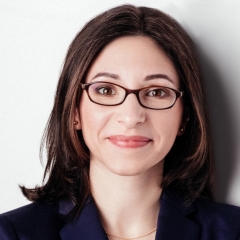Emilie Dressaire
University of California Santa Barbara
Seminar Information
Engineering Building Unit 2 (EBU2)
Room 479
Seminar Recording NOT Available

Fluid flows can generate stresses sufficiently large to destabilize interfaces, deform and fracture solid substrates. The deformation of the solid substrate is often considered to be in the linear elastic regime. And while the interactions between fluid flow and surface deformation are typically studied with a single fluid, two-phase flows are common in agricultural, manufacturing, and energy processes. In this talk, I will present two recent studies on flows confined by deformable, soft boundaries that can rupture and fracture.
First, we will consider the propagation of a liquid-filled fracture. The injection of the fluid in a brittle elastic material drives the formation and growth of a penny-shape fracture. Using model experiments, we characterize the fracture dynamics. The viscous dissipation in the fluid, the elastic stresses and toughness of the matrix control the flow in the fluid-filled fracture. We demonstrate that the propagation, during and after injection depends on the regime of fracture propagation, fluid-controlled vs matrix-controlled.
Then, I will present results on the atomization of oil in water emulsions. We study the impact of a drop of emulsion on a small target which leads to the formation and atomization of a liquid sheet. Here the dispersed phase is confined between air/liquid interfaces. The oil droplets modify the dynamics of an aqueous liquid sheet and its break-up into droplets. As the viscosity of the oil phase decreases and the surface tension difference between the phases increases, the liquid sheet becomes more unstable, and holes are primarily responsible for the atomization of the sheet.
These studies illustrate the complex couplings between multiphase flows and substrate deformation.
Emilie Dressaire received a B.S. in Engineering from ESPCI, France, in 2005, and a Ph.D. in Mechanical Engineering from Harvard University in 2009. She joined the Mechanical and Aerospace Engineering Department at NYU Tandon School of Engineering in 2014. She is now a faculty member in the Department of Mechanical Engineering at UCSB. She served as a Member-at-Large on the Executive Committee of APS Division of Fluid Dynamics from 2018-2021. Her research interests are centered around small scale fluid mechanics and soft matter physics, specifically focusing on poro-elasticity in biological systems and for bioengineered solutions.
